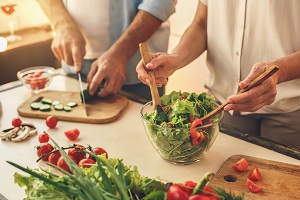Nutrition for caregivers

You know how important nutrition is for good health. And you know you should eat better. But when you’re a caregiver, having time to think about planning your own meals can seem like a luxury. How can you think about nutrition, much less do anything about it, when you have so much to do in your caregiving role?
It’s important to find a way to eat well. You’ve no doubt heard this before, but it bears repeating—you have to take care of yourself before you can take care of anyone else. Eating nutritious foods as much as possible is one of the best ways you can do that.
The benefits of eating well
The rewards of having a well-balanced diet are worth it. When you prioritize nutrition, you can:
- Increase your energy level
- Feel better emotionally
- Strengthen your immune system
- Reduce the risk of developing infections
- Get to or stay at a healthy weight
- Lower your risk of heart disease, cancer, and diabetes
- Reduce recovery time when you get sick
- Strengthen your bones and teeth
- Set a good example for others, so they can reap these rewards as well
Small steps add up
So, how do you eat well? By making changes wherever you can, whenever you can. Here are some ideas to get you started:
- Get lots of great information about food groups and general dietary guidelines online at MyPlate.gov, a website from the USDA that has the latest Dietary Guidelines for Americans.
- Eat a healthy breakfast. Since it’s the first meal of the day, it’ll give you the energy you need to get things done.
- Add something nutritious to your current meal plan instead of taking something away. For example, add chopped veggies to your eggs in the morning and to your pasta at dinner. You can still have a little something sweet for dessert.
- Find healthy substitutions. For example, switch from white rice or pasta to whole grain versions for extra fiber and vitamins.
- Keep snacking, but make sure to choose healthy snacks.
- Cut down on highly processed foods and foods with added sugar, including sugary drinks.
- Drink water every day. The Mayo Clinic recommends about 11.5 cups for women and about 15.5 cups for men.
- Learn how to read the nutrition labels on packaging. This will help you make better choices about what you eat.
You don’t need to do all of these things at once. You can take one at a time, in whatever order you wish. For example, try having a healthy breakfast each morning for a week and see how you feel. Do you have more energy? Are you less tempted to binge on unhealthy food later in the day? Are you performing better at work? Are you getting used to the routine of preparing a breakfast meal?
How to plan ahead for easier food prep
Even with these new habits, you may still feel pressed for time. That’s where planning ahead can help.
- Keep an ongoing shopping list. You can do this on paper or use a grocery app on your phone. Whatever method you choose, be sure to add items to your list when you think of them. That way your list is always up to date.
- Use a slow cooker. You can have meals cook overnight or while you’re out during the day.
- Use a programmable pressure cooker, like the Instant Pot. It cooks meals fast.
- Cook in batches. Double the recipes of your favorite dishes and refrigerate or freeze leftovers. Store leftover soups, sauces, and veggies in airtight bags or containers.
- Cut extra veggies. Then you'll have them for another meal or a snack.
- Stock your pantry with low-sodium, low-fat canned foods. Think beans, stocks and broths, quick-cooking whole grains, tuna, chicken, salmon and clams. These are great for fast, inexpensive, easy meals.
Ask for and accept help
Sometimes, all you need is an extra hand. If you have family or friends available, invite them to help you by:
- Doing the grocery shopping
- Making dinner one night a week
- Chopping vegetables for a stir fry
- Preparing a sauce or marinade (with extra for freezing)
- Cleaning up the kitchen after dinner
- Sharing easy, healthy recipes with you
Or you could ask for their help with other caregiving tasks, so you can do the shopping and cooking yourself.
It takes the average person about 6 weeks to create a habit, whether it’s good or bad. In other words, getting into the habit of eating healthier takes time. And it's worth it. Start where you are—with small changes that you can easily make. That will go a long way to changing your diet, and your life, for the better.
Originally posted: August 2019
Last updated: August 2024
More...
Burnout
Self care
Wellness
Get more tips
Subscribe to the Caregiver Connection, and we will send you an email when a new article has been posted.
SUBSCRIBE
Take the next step
Our customized care programs focus on keeping older adults at home while also supporting you, the caregiver.
LEARN MORE